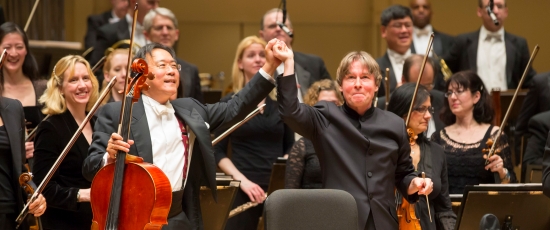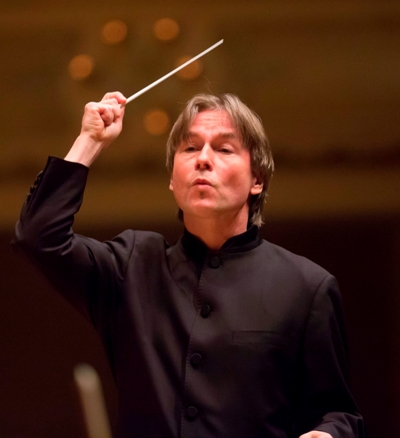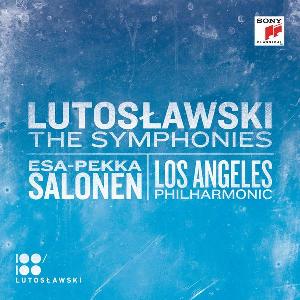Honoring composer whose time may be now, Salonen, Yo-Yo Ma make case for Lutosławski
 Review: Conductor Esa-Pekka Salonen and cellist Yo-Yo Ma in a Chicago Symphony Orchestra concert of Sibelius, Tchaikovsky and Lutosławski through March 2. ★★★★★
Review: Conductor Esa-Pekka Salonen and cellist Yo-Yo Ma in a Chicago Symphony Orchestra concert of Sibelius, Tchaikovsky and Lutosławski through March 2. ★★★★★
By Nancy Malitz
Among the Chicago Symphony Orchestra’s most important relationships with conductors in their prime middle years is surely that with Finnish conductor and composer Esa-Pekka Salonen, 54, who led a concert of Tchaikovsky, Sibelius and Lutoslawski so compelling that it made one want to go back to the box office and do the whole thing all over again.
 Salonen has a way of making Tchaikovsky and Sibelius sound ferociously forward. He conducts with bracing authority from the standpoint of a composer with the sensibility and language of a fully tricked out contemporary artist and intellectual, offering boundless enthusiasm in the bargain.
Salonen has a way of making Tchaikovsky and Sibelius sound ferociously forward. He conducts with bracing authority from the standpoint of a composer with the sensibility and language of a fully tricked out contemporary artist and intellectual, offering boundless enthusiasm in the bargain.
To be sure, if you are steeped in Bach and Beethoven, you will find much to admire in Salonen’s Tchaikovsky and Sibelius. But there’s such an eclectic edge and original grace to what Salonen does that his reach goes well beyond the traditional classical crowd and speaks directly to a modern audience.
So it was that an epic sonic combat between cello and orchestra by the late-20th century Polish composer Witold Lutosławski was the program’s centerpiece and its highlight, although a brutally magnificent performance of Sibelius Seventh Symphony, seemingly designed as if to showcase the Chicago Symphony sound, was there to frame it along with two tone poem showpieces — Sibelius’ “Pohjola’s Daughter” and Tchaikovsky’s “Francesca da Rimini.”
Salonen was interested in every aspect of modernity in these older works — the shards of deconstruction, the vast expanses, the rivetting waves of dark color and vaguely disturbing chromatic movement. All three sounded very new.
 Yet the overtly theatrical Lutosławski Cello Concerto took the prize, throwing congenial focus on CSO creative consultant Yo-Yo Ma, who threw himself into the challenge of wits that unfolded. The concerto, which was introduced by Mstislav Rostropovich in 1970, begins with the cellist alone in a Beckett-like monologue of silence sprinkled with musical mono-syllables.
Yet the overtly theatrical Lutosławski Cello Concerto took the prize, throwing congenial focus on CSO creative consultant Yo-Yo Ma, who threw himself into the challenge of wits that unfolded. The concerto, which was introduced by Mstislav Rostropovich in 1970, begins with the cellist alone in a Beckett-like monologue of silence sprinkled with musical mono-syllables.
Then the trumpets burst in like a gang on the corner, mocking and impatient, with murderous intent. What follows is a series of sometimes playful, sometimes strident and often unforgettably sad exchanges, most of them abruptly ended by a surreal racket from the brass just as some cello idea is reaching its culmination. It’s a sadistic game of cat and mouse, in a way, except the destructive clamor is fabulously wicked. And the cello does finally manage to slip free at the end, on a surpassing thread of melody.
Funny how the ear changes over time. The audience was clearly fascinated, chuckling at first, then rapt, finally applauding at length. The question of any musical language barrier was settled early; there was none.
 But when I first heard Lutosławski’s concerto in the ’70s, I was keenly aware how hard the musicians seemed to be counting. The listeners also seemed mystified, and there was a lot of post-concert discussion given to the so-called aleatoric (or chance) passages, where the conductor marked out certain sections like a traffic cop and the instrumentalists followed their individual instructions in a sort of controlled chaos.
But when I first heard Lutosławski’s concerto in the ’70s, I was keenly aware how hard the musicians seemed to be counting. The listeners also seemed mystified, and there was a lot of post-concert discussion given to the so-called aleatoric (or chance) passages, where the conductor marked out certain sections like a traffic cop and the instrumentalists followed their individual instructions in a sort of controlled chaos.
Salonen is undertaking a continent-hopping, season-long tribute to Lutosławski, who was born 100 years ago this year. To my mind the conductor seems poised to do for Lutosławski what Leonard Bernstein did for Mahler. Each was not the first champion, but perhaps the most important, embarking at just the right time upon sustained, attention-grabbing efforts to secure their beloved composer’s lasting popularity.
 Salonen surely will make Lutosławski a favorite of the major orchestras he conducts, and judging by the Chicago audience’s overwhelming response, he will hook listeners as well. This season alone, Salonen will take Lutosławski’s music to many other cities — including London, Tokyo, Vienna and Paris — with concerto and vocal soloists including pianist Krystian Zimerman, cellist Truls Mørk and baritone Matthias Goerne.
Salonen surely will make Lutosławski a favorite of the major orchestras he conducts, and judging by the Chicago audience’s overwhelming response, he will hook listeners as well. This season alone, Salonen will take Lutosławski’s music to many other cities — including London, Tokyo, Vienna and Paris — with concerto and vocal soloists including pianist Krystian Zimerman, cellist Truls Mørk and baritone Matthias Goerne.
Those of us without a couple million frequent flyer miles will have to settle for Salonen’s forthcoming release of all four Lutosławski symphonies with the Los Angeles Philarmonic on the Sony Classical label — enticing consolation. (There is also a wonderful body of Lutosławski background material on YouTube, much of it a project of Salonen’s current orchestra, the Philharmonia of London.
Lutosławski does have other champions — there are recordings by Estonian conductors Neeme and Paavo Järvi, for example. And a rich stream of conductors from the same Finnish conservatory training that produced Salonen also favors Lutoslawski’s music. You will hear it from Salonen contemporaries such as Jukka-Pekka Saraste and Osmo Vänskä, as well as from Sakari Oramo and Susanna Mälkki in their 40s and Mikko Franck and Pietari Inkinen in their 30s.
Clearly, the stars are aligned for Lutosławski now.
Related Links:
- Follow Esa-Pekka Salonen’s schedule: Visit esapekkasalonen.com
- Anne-Sophie Mutter performs Lutosławski March 10, 2013: Order tickets
- Remaining CSO concerts – location, dates and times: Visit cso.org
- CSO 2012-13 season preview: Read it at ChicagoOntheAisle.com
Captions and Credits: Cellist Yo-Yo Ma and conductor Esa-Pekka Salonen perform with the Chicago Symphony Orchestra Feb. 28, 2013. (CSO photos by Todd Rosenberg.) Composer Witold Lutosławski, born 1913, at his home. (W. Pniewski and L. Kowalski via Wiki Commons) Image of CD jacket for the forthcoming recording of the complete Lutosławski symphonies with the Los Angeles Philharmonic, conducted by Esa-Pekka Salonen, for Sony Classical.
Tags: Chicago Symphony Orchestra, Esa-Pekka Salonen, Jukka-Pekka Saraste, Krystian Zimerman, Los Angeles Philarmonic, Matthias Goerne, Mikko Franck, Neeme Järvi, Osmo Vänskä, Paavo Järvi, Philharmonia of London, Pietari Inkinen, Sakari Oramo, Sibelius, Sony Classical, Susanna Mälkki, Tchaikovsky, Truls Mørk, Witold Lutosławski, Yo-Yo Ma



Great composer indeed. Jukka-Pekka Saraste is conducting Lutoslawski’s 3rd symphony in Paris tonight. Looking forward.
Great composer indeed. Jukka-Pekka Saraste is conducting Lutoslawski’s 3rd symphony in Paris tonight. Looking forward.